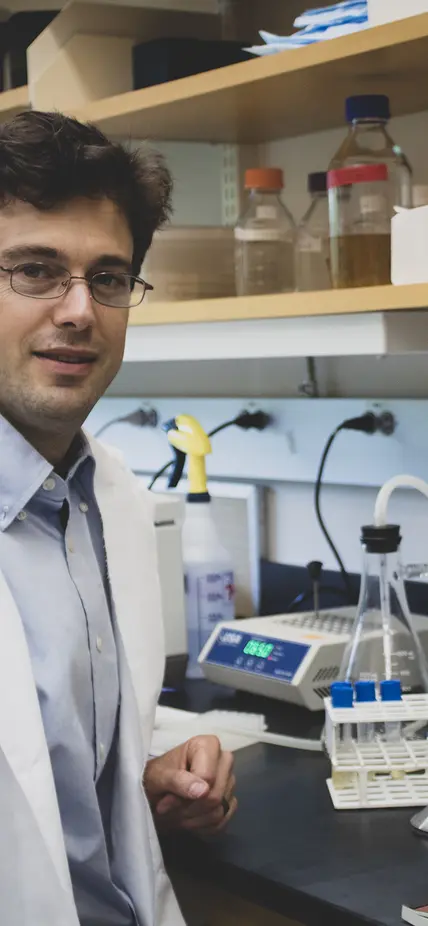Baltimore, MD—Carnegie’s William Ludington is co-leading one of eight research teams from across the U.S. and Canada who were awarded a $50 thousand Scialog grant.
The initiative, which is sponsored by the Research Corporation for Science Advancement, The Paul G. Allen Frontiers Group, and the Frederick Gardner Cottrell Foundation, with support from the Walder Foundation, was designed to stimulate interdisciplinary research that will advance the our knowledge of the connections between the microbiome and neurobiology.
The microbiome is an ecosystem of hundreds to thousands of microbial species living within the human body. These populations affect our health, fertility, and longevity. But there is still much to learn about how these microbial species produce these effects on our bodies.
Together with Karthik Shekhar of UC Berkeley, Ludington will investigate how signals from the gut can activate glial cells, which support healthy neuron function, into an inflammatory and neurotoxic state. In order to better understand this phenomenon, they will probe the gut-brain axis using a variety of molecular and computational tools.
Since arriving at Carnegie in 2018, Ludington has advanced microbiome research using genetic, physiological, and computational approaches, revealing new information about how the microbiome acquires new species, the evolutionary trajectories of microbiome communities, and how microbiome interactions drive a form of antibiotic resistance. The Scialog program, short for “science + dialog” was created by RCSA in 2010 by to support new research directions by stimulating intensive interdisciplinary conversations and community building around a globally important science theme.
For each themed Scialog initiative, teams of two or three fellows who have not previously collaborated compete for seed funding for novel research projects based on the ideas that emerge at a conference attended by all of the program’s participants. Earlier this year, 30 chemists, physicists, biologists, and neurophysiologists met in Arizona for the third and final Microbiome, Neurobiology, and Disease Scialog.
“When they come together, people from many different disciplines can formulate new research directions and new possibilities for discovery that perhaps they couldn’t do on their own,” said RCSA President & CEO Daniel Linzer. “Helping each other get away from their comfort zones and do something risky can lead to interesting science.”
This is the second Scialog grant that Ludington has won in the three-year initaitive. In 2021, he and UCLA’s Nandita Garud were chosen for their project on the relationships between genetic changes in the microbiome and age-related frailty.
“Congratulations to Will on this achievement,” said Biosphere Sciences and Engineering Deputy Director Stephanie Hampton. “Selection for two Scialog grants within a single themed initiative demonstrates what a central role he plays in pushing the boundaries of microbiome research and advancing the field in exciting new directions.”
